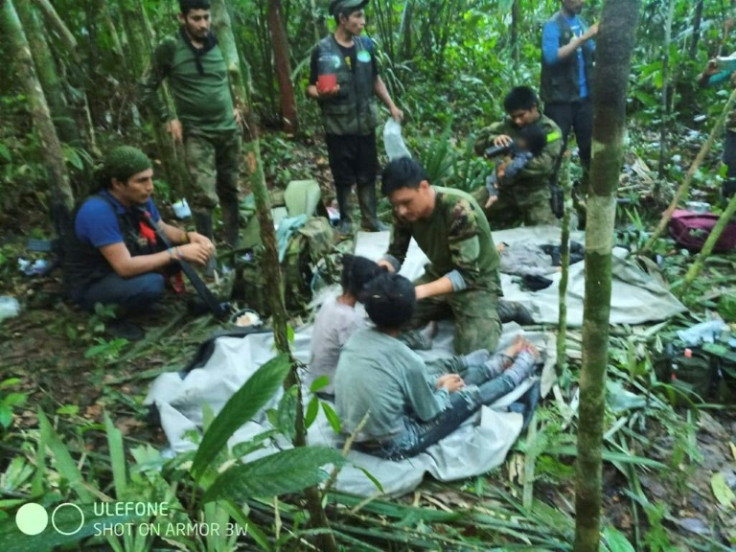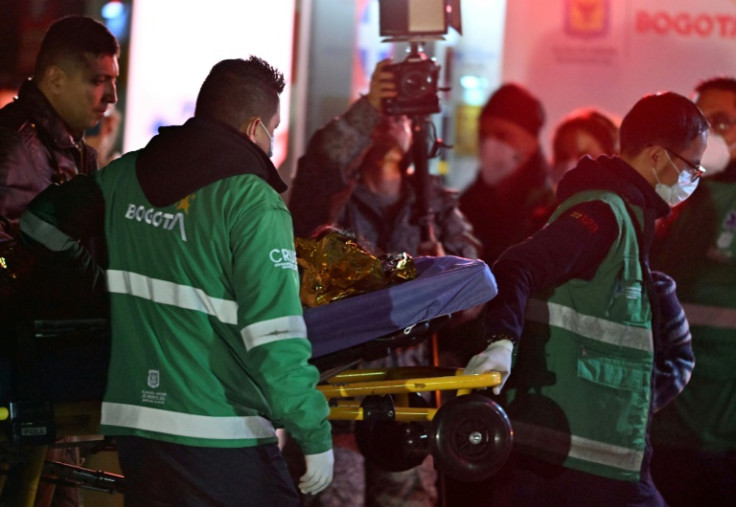The 40-day Colombian Jungle Search For Four Missing Children

For 40 days after their plane crashed, four Indigenous children were lost in the Colombian Amazon rainforest.
A major search operation, with rescuers finding a steady string of clues about their whereabouts, came to an end on Friday with the discovery of the children alive.
They were flown to the capital Bogota early Saturday, where ambulances awaited. AFP looks at the timeline of events.
On the morning of May 1, a Cessna 206 plane run by Avianline Charters left a jungle area known as Araracuara to head for San Jose del Guaviare, one of the main towns in the Colombian Amazon.
On board were the pilot, an Indigenous leader of the Huitoto community, as well as Magdalena Mucutui Valencia and her four children -- aged 13, nine, four and 11 months.
Minutes after starting the 350-kilometer (217-mile) flight over the jungle, the pilot reported engine problems and the plane disappeared from radar.
According to officials, the four Huitoto siblings boarded the plane with their mother to flee threats from members of an armed group.
Between May 15 and 16, soldiers found the bodies of the pilot and the two adults in the Caqueta area. The plane was stuck vertically in thick vegetation, with its nose destroyed.
They did not locate the children.
A sniffer dog found the baby's bottle in a secluded spot near the crash site.
More than 100 military personnel were deployed to the area, suspecting there was at least one survivor.
The search was joined by dozens of Indigenous people from nearby villages who are accustomed to traveling through the Amazon -- home to jaguars, snakes and other predators, as well as armed drug smuggling groups.
Military aircraft dumped 10,000 flyers into the forest with survival tips and instructions in Spanish and the children's own Indigenous language.
An air force helicopter also broadcasted an audio recording of the children's grandmother, urging them to stay put.
Shoes, clothes and half-eaten fruit were found among the trees.
About 2.5 kilometers from the crash site, soldiers also found a camp abandoned by guerrillas.
Heavy rainfall and giant trees that can grow up to 40 meters (130 feet) tall made the "Operation Hope" search difficult.
Three weeks after the crash, soldiers found diapers and shoes, and claimed that they had passed within 100 meters of the children. The search was reduced to a 20-square-kilometer section of jungle.
On May 17, soldiers came across a makeshift shelter, constructed out of sticks and branches. A dog also found scissors and hair ties.
On the same day, President Gustavo Petro announced that the children had been found alive. But he retracted the statement a day later, saying he had been given false information.
On May 26, the military organized a symbolic celebration for the baby, who turned one year old that day, having spent almost a month lost in the jungle.
On June 9, Petro announced that the children were found alive and released a photo showing them surrounded by soldiers and Indigenous people who participated in the search. The children appear thin and have no shoes.
"They were alone, they made it on their own. An example of absolute survival that will go down in history," the president said.
According to the military, rescuers found the children about 5 kilometers west of the crash site.
Army rescuers "immediately took charge of and stabilized" the four siblings, who were transferred to San Jose del Guaviare, according to the defense minister.
They arrived at a military airport in Bogota early on June 10, with ambulances waiting to take them to hospital.

© Copyright AFP 2024. All rights reserved.





















